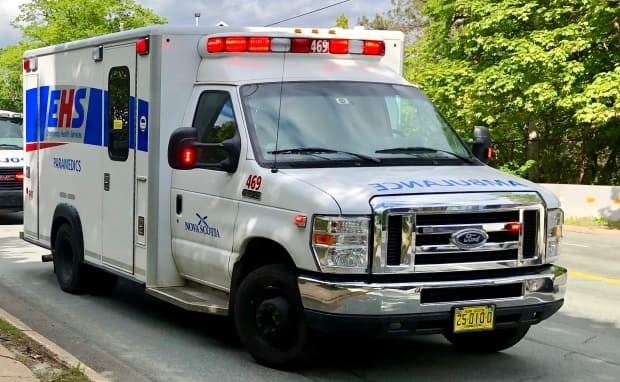N.S. to waive ambulance fees for people who have adverse reactions to COVID vaccines

Sarah Lindh was still in the vaccine clinic when she knew something wasn't right.
The Dartmouth, N.S., resident had her first COVID-19 vaccine a few weeks ago. Within minutes of getting her dose of Moderna, she was on the floor, unable to move. Her body was overheated, then she broke out in cold sweats and her vision was blurred.
"I didn't even make it to the 15 minutes from getting the shot before you're allowed to leave," she said.
As the muscles in parts of her body locked up, staff at the clinic called an ambulance and Lindh was brought to hospital. She was there for a few hours before starting to feel normal again and was discharged.
Unexpected ambulance bill
Lindh said she was exhausted for the next four days.
"It was like I got hit by this truck that just, like, drained all my energy," she said. "It was crazy."
As her energy increased, so, too, did her frustration levels.
Last month, the provincial government announced ambulance fees would be waived for anyone with a COVID-related emergency. The move was intended to ensure people who needed help called for it as soon as possible, without worrying about the $146.55 bill.
But when Lindh asked about her fee being waived, she was told her situation didn't qualify as a COVID emergency.
Angela Seaboyer was told the same thing.
'I knew this isn't normal'
The Annapolis Valley resident started having a reaction to her first dose of Astrazeneca-Oxford vaccine a day after getting the shot.
Her symptoms escalated quickly, with a crushing headache followed by a burning sensation in her legs. Then her stomach became upset and she had difficulty breathing.
"I knew this isn't normal, something is going on," she said.
An ambulance was called and Seaboyer was taken to hospital. She was discharged with orders to return if her headache got worse or her other symptoms returned. She found herself short on energy and easily tired for the next few days. Eventually she returned to hospital, although this time she drove herself.
When she found out a bill was coming for the ambulance ride, she assumed she wouldn't have to worry about it, that the fee would be waived. Then she found out otherwise.
"They said because I didn't test positive for COVID, it wasn't COVID related," she said.
"I didn't understand that."
As of June 4, 25,387,552 COVID-19 vaccines had been administered in Canada, with adverse reactions reported by 6,864 people, according to the federal government. That equals about three people out of 10,000 who have reported adverse events.
Province extends fee waiver
On Monday, as Lindh was preparing to file for a financial exemption from the fee and Seaboyer was awaiting the results of an appeal she filed, the provincial government amended its policy following a request for comment from CBC.
A Health Department spokesperson said via email that coverage of ambulance fees would now also include adverse reactions to a COVID-19 vaccine. Anyone billed for an ambulance under those circumstances can contact the service provider to discuss the situation.
Both women were pleased to learn of the change in policy, but NDP Leader Gary Burrill questions why it was necessary in the first place.
Burrill, whose party has advocated for all emergency-related ambulance fees being removed, said the situation shows the limitations of proceeding by exemptions or exceptions because it leaves room for interpretation of what does and does not qualify.
"That's why you need to have ambulance fees eliminated across the board," he said.
Burrill said common sense should have been enough for officials to recognize that someone requiring an ambulance due to a bad reaction to a COVID-19 vaccine was, in fact, having a COVID-related emergency.
MORE TOP STORIES

 Yahoo Movies
Yahoo Movies 